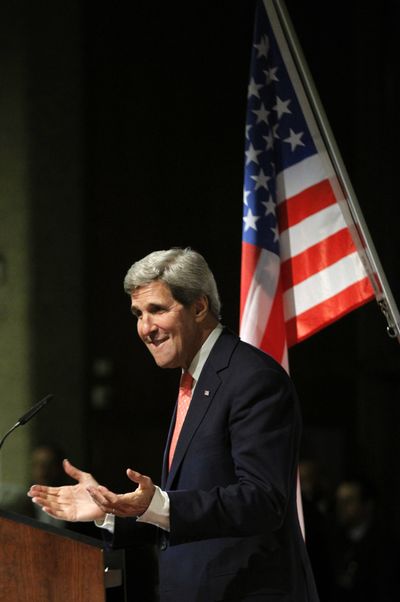Iran nuclear talks falter as France seeks tougher terms

WASHINGTON – After days of rising expectations, diplomats from six world powers failed in marathon talks with Iran to seal a preliminary deal aimed at launching comprehensive negotiations on Tehran’s disputed nuclear program.
Foreign ministers, who had hoped for a breakthrough on one of the world’s most urgent security challenges, said instead early today that they had been unable in 16 1/2 hours of talks Saturday to resolve issues raised by France.
As a result, they said, lower-level officials will return to Geneva in 10 days to resume their effort to end a decade of diplomatic stalemate on the issue.
Mohammad Javad Zarif, Iran’s foreign minister, told reporters that “it was natural that when we started dealing with the details, there would be differences.” But he insisted that the group had made progress in three days of talks, and that “we are all on the same wavelength.”
Secretary of State John Kerry, who had flown to Geneva on Friday when it appeared there might be a breakthrough in the negotiations, said, “There’s no question in my mind that we’re closer now … than when we came.”
The world powers have been seeking to design a deal that would offer Iran a temporary easing of the punishing sanctions on its economy in return for temporary, limited curbs on its nuclear development program. The group – consisting of the U.S., France, China, Russia, Germany and Britain – wants to prevent Iran from advancing toward nuclear weapons capability over the next six months or so it would take to negotiate a final deal.
The nations fear that Iran may be seeking the capability to build a nuclear bomb, despite its declarations that it is seeking to develop nuclear resources only for energy purposes.
But the draft text of an agreement being developed was challenged Friday and Saturday by France, which wanted to toughen the terms of the deal offered to Iran on a heavy-water nuclear plant now under construction, and on its stockpile of medium-enriched uranium. France also wanted to adjust the terms of the sanctions relief offered to Iran.
“One wants a deal … but not a sucker’s deal,” Laurent Fabius, the French foreign minister, told a French radio station.
The group ground through a series of meetings with various combinations of diplomats, even convening a full gathering of foreign ministers just before midnight in a last attempt to dash across the finish line.
Instead, the diplomats emerged with polite praise for one another but without the prize they were seeking.
Diplomats of other Western countries grumbled about France’s late objections, and Fabius’ decision to discuss their differences in the open, at a time when the Americans and other delegations had agreed to keep the discussion under wraps.
Kerry signaled that there had also been Iranian resistance. “It takes time to build confidence between countries that have really been at odds with each other for a long time,” he said.
Some analysts argued that the outcome was not a major setback because talks would continue. Iran, they said, needs desperately to relieve the pressure on its economy, and the world powers want to keep Iran from building a nuclear bomb and avoid the possibility of a U.S. or Israeli attack to stop it from doing so.